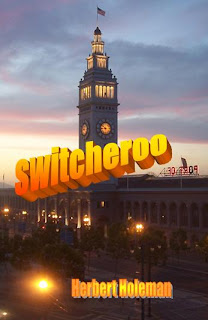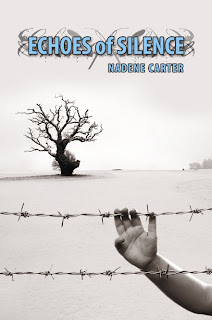 Why did you pick the setting you used in your story? I'm not looking for -- "because I live there". I want you to dig deep and tell us...Why you chose that particular setting?
Why did you pick the setting you used in your story? I'm not looking for -- "because I live there". I want you to dig deep and tell us...Why you chose that particular setting?Wednesday, July 25, 2007
Switcheroo by Herbert Holeman
 Why did you pick the setting you used in your story? I'm not looking for -- "because I live there". I want you to dig deep and tell us...Why you chose that particular setting?
Why did you pick the setting you used in your story? I'm not looking for -- "because I live there". I want you to dig deep and tell us...Why you chose that particular setting?Echoes of Silence by Nadene Carter

Echoes of Silence
Why did you pick the setting you used in your story? I'm not looking for -- "because I live there". I want you to dig deep and tell us...Why you chose that particular setting?
My story, Echoes of Silence, is built around a historically factual incident. Outside this kernel of truth, it is an entirely “made up” story. However, because it is based on fact, the setting needed authenticity.
What does the setting add to the story?
The setting becomes almost like one of the story characters. You see the setting in your mind’s eye, you feel the anger and tension played out in this setting, and the setting provides a vivid backdrop for the story.
Could you write the same story in a different setting? Why or why couldn't you use a different setting?
No, this story couldn’t happen in a different setting. The setting and the story are dependent on each other. One couldn’t exist without the other.
Did you use a real place as a basis for your setting? Or, did you create the setting from scratch?
It is a “real” place, but other than the general area, I fictionalized the setting. If you drove to this area of Malheur County Oregon, you wouldn’t recognize my fictional town of McGregor, Oregon. I gave the town and surrounding towns different names to protect the innocent and the guilty. Tell us some specific details about your setting.
What would we see? What sort of people are there?
In this story setting, you find the local residents of McGregor, Oregon. The area is a melting pot of sorts, with many immigrant families having moved there from England, the Scandinavian countries, Germany, etc. Enter … a small group of Japanese-Americans who have agreed to work in the sugar beet fields of Malheur County rather than sit out the remainder of World War II in the Minidoka, Idaho internment camp. This, by the way, is the kernel of truth in this historical fiction novel.
Thank you for sharing details about your book setting. Now, what's the title of your book and where can we buy it? Thank you for allowing me to tell you about my book. This was the one that begged to be written. The title of my book is Echoes of Silence. You can read more about the story and purchase the book at this URL: http://epress-online.com/CARTER/Echoes-Of-Silence/sales-page.htm
Sunday, July 22, 2007
Kennalyn Describes Modern Day Misty Cove
Misty Cove Background
Misty Cove is my fictional setting for a series of novels. The first is Stormy View and its a contemporary romance. Widow's Walk is a historical which is set in Misty Cove between 1841 and 1862. Rebels and Rogues will begin in the opening days of the Civil War and the main character will travel from Misty Cove along the battle lines of the war.
Kennalyn's Misty Cove
Cape Ann is a beautiful section of the Massachusetts coast. It’s not as well known as Cape Cod, but the residents like it that way. They appreciate the quieter beauty of our area. Cape Cod bustles with people and that includes a lot of tourists. Cape Ann has a lot of history and tranquil beauty without the tourists.
The winters in New England can be bad. The water looks intriguing with snow falling against it and with the snow piled on the boats. Many a fishing shack has been almost covered with snow during a blizzard.
Downtown Misty Cove area has the old lantern style street lights. These are much nicer than the harsh street lights in the big cities. Some of the windows on the downtown stores have colorful awnings which accentuate their stores and draw the customers to the windows to see their wares.
Thursday, July 19, 2007
WIndwalker by Donna Sundblad
Why did you pick the setting you used in your story?
The setting takes place in a pre-industrial setting in a fantasy world one culture calls The Land, because their belief system teaches that they are sojourners in The Land. When people name a land they tend to think it belongs to them. On the other side of the plot is a second culture who arrives at the shores of the land which they name Ranaan. And guess what—within a few hundred years they think they own it.
Why you chose that particular setting?
This fantasy story line deals with issues of discrimination and differences in belief systems. I set it in a fictional place to avoid anyone thinking of am talking about a certain place that would allow discrimination and prejudice to lead to genocide.
What does the setting add to the story?
The setting plays an important part in the story. One place in particular is the Fortress of Stone. This place is foretold to hold the answers needed to bring peace to the Land. Laws are enforced to make sure no such place exists, but within this setting we learn that it is a natural rock formation within the Valley of Rocks.
Could you write the same story in a different setting?
I could write a similar story, but not the same story. The setting provides the pieces that make the plot work. Things like the Sacred Stairway, the Cage of Ice, and Yolk of Inspiration are all part of the setting within the Land. Without them, the story could not take place.
Why or why couldn't you use a different setting?
I explained this above, but let me say here that the setting provides the elements necessary for the magical powers of the antagonist to make the plot thicken with tension. The setting also includes elements that allow the protagonists to find the solutions to the problem if they just have the faith to do so. If they don't the entire civilization (both cultures) face destruction.
Did you use a real place as a basis for your setting?
I did research on various places to understand things like volcanoes and flooding, but the setting itself is a mixture of places and experiences in my life. The Land has mountains, valleys and a coastline.
Or, did you create the setting from scratch?
Yes, I created it from scratch and developed a map as I went along to make sure things came together in a realistic way.Tell us some specific details about your setting.
What would we see? What sort of people are there? If we were traveling to your setting, what should we bring with us? For visitors, what do they need to know to visit your setting?
As I said, it's a pre-industrial society. At the start of the story you'll see dark-eyed indigenous people living in the Land awaiting the ships their prophets had predicted would come—along with a lingering menace.You'll see kind people among the indigenous Stygian people and the fair-eyed Jonnick who come to shore with a disease fatal to many of both cultures. But among them is a white stone tied to a different spirit and with it a curse that follows the Jonnick. Both cultures learn to work together to survive, but eventually part ways. Beyond that you'll see villages, secret caves, the Valley of Rocks and the Valley of Blades. It's a one-of-a-kind world and one worth visiting.Thank you for sharing details about your book setting.
Now, what's the title of your book and where can we buy it?
WindwalkerAvailable at epress-online
http://www.epress-online.com/SUNBLAD/Windwalker/sales-page.htm
Thank you to Donna for telling us about her setting. Will your's be posted next?
Nikki Leigh
http://www.nikkileigh.com/
Lilah and the Locket in the Kitty Hawk Free Press
Kitty Hawk is one of the towns along the Outer Banks and I have "Kitty Hawk" set in my Google alerts. I saw an article about Cape Hatteras on the Kitty Hawk Free Press this morning and I emailed the editor about my book.
Click here - http://www.kittyhawkfreepress.com/ and scroll down past the picture of the motorcycle at the lighthouse. He posted my “behind the story” piece about Lilah which offers some background information about how the story came to be.
I always say that it doesn't hurt to ask -- many people say "yes".
Nikki
Nikki Leigh – Fiction Author – www.nikkileigh.comBook Promo 101 – www.nikkileigh.com/book_promo_101.htm“Coastal Suspense with a Touch of Romance”
Wednesday, July 18, 2007
HOW TO SUBMIT
Why you chose that particular setting?
What does the setting add to the story?
Could you write the same story in a different setting?
Why or why couldn't you use a different setting?
Did you use a real place as a basis for your setting?
Or, did you create the setting from scratch?
Is there anything else about your setting that we need to know? Feel free to share.
Please provide your website link.
What is the link to buy your book?
Tell us some specific details about your setting. What would we see? What sort of people are there? If we were traveling to your setting, what should we bring with us? For visitors, what do they need to know to visit your setting?
Thank you for sharing details about your book setting. Now, what's the title of your book and where can we buy it?
Feel free to email your answers to nikki_leigh22939@yahoo.com and I'll add your information. They will be posted, but not all at once. That will give everyone an opportunity to get plenty of exposure.
Nikki Leigh
www.nikkileigh.com/book_promo_101.htm

